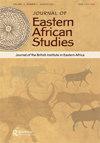克服在位优势:社交媒体在赞比亚2021年选举中的重要性
IF 0.6
3区 社会学
Q2 AREA STUDIES
引用次数: 3
摘要
摘要总统埃德加·伦古和爱国阵线利用一系列在职优势,在赞比亚2021年大选前夕将竞争环境向有利于他们的方向倾斜,因此,他们在离线时比反对党国家发展联合党及其旗手哈坎德·希奇莱马更为明显。在本文中,我们利用对党内官员和活动人士的原始调查和半结构化采访,来考虑社交媒体在UPND胜利中的作用。我们展示了两个占主导地位的政党是如何在社交媒体上投入巨资的,但事实证明,UPND的在线信息更具说服力,并在线下传播,以及社交媒体是如何在高度不均衡的竞争环境下促进UPND的政治动员和选票保护工作的。因此,社交媒体在罢免现任总统方面发挥了重要作用,但这并不是因为选举是在网上赢得的,也不是因为社交媒体提供了一种独特的“社交”交流形式。相反,社交媒体有助于促进信息在严格控制的媒体生态系统中的流动,在这个生态系统中,面对面交流仍然是关键。在提出这一论点时,我们强调了社交媒体对用户和非用户的重大影响,即使在互联网渗透率相对较低的情况下也是如此。本文章由计算机程序翻译,如有差异,请以英文原文为准。
Overcoming incumbency advantage: the importance of social media on- and offline in Zambia’s 2021 elections
ABSTRACT President Edgar Lungu and the Patriotic Front used a range of incumbency advantages to tilt the playing field in their favour in the run-up to Zambia’s 2021 elections and, as a result, were more visible offline than the opposition United Party for National Development (UPND) and its flagbearer, Hakainde Hichilema. In this paper, we draw on an original survey of party officials and activists and semi-structured interviews to consider the role of social media in the UPND’s victory. We show how the two dominant political parties invested heavily in social media, but how the UPND’s online messaging proved more persuasive and spread offline, and how social media facilitated the UPND’s political mobilisation and vote protection efforts in the face of a highly uneven playing field. Social media thus played an important role in unseating the incumbent, but not because the election was won online, or because social media provided a uniquely “social” form of communication. Instead, social media helped to facilitate the flow of information across a heavily controlled media ecosystem in which face-to-face communication remained key. In making this argument, we highlight the significant impact of social media on users and non-users alike, even in a context of relatively low internet penetration.
求助全文
通过发布文献求助,成功后即可免费获取论文全文。
去求助
来源期刊

Journal of Eastern African Studies
AREA STUDIES-
CiteScore
3.30
自引率
7.10%
发文量
12
期刊介绍:
Journal of Eastern African Studies is an international publication of the British Institute in Eastern Africa, published four times each year. It aims to promote fresh scholarly enquiry on the region from within the humanities and the social sciences, and to encourage work that communicates across disciplinary boundaries. It seeks to foster inter-disciplinary analysis, strong comparative perspectives, and research employing the most significant theoretical or methodological approaches for the region.
 求助内容:
求助内容: 应助结果提醒方式:
应助结果提醒方式:


